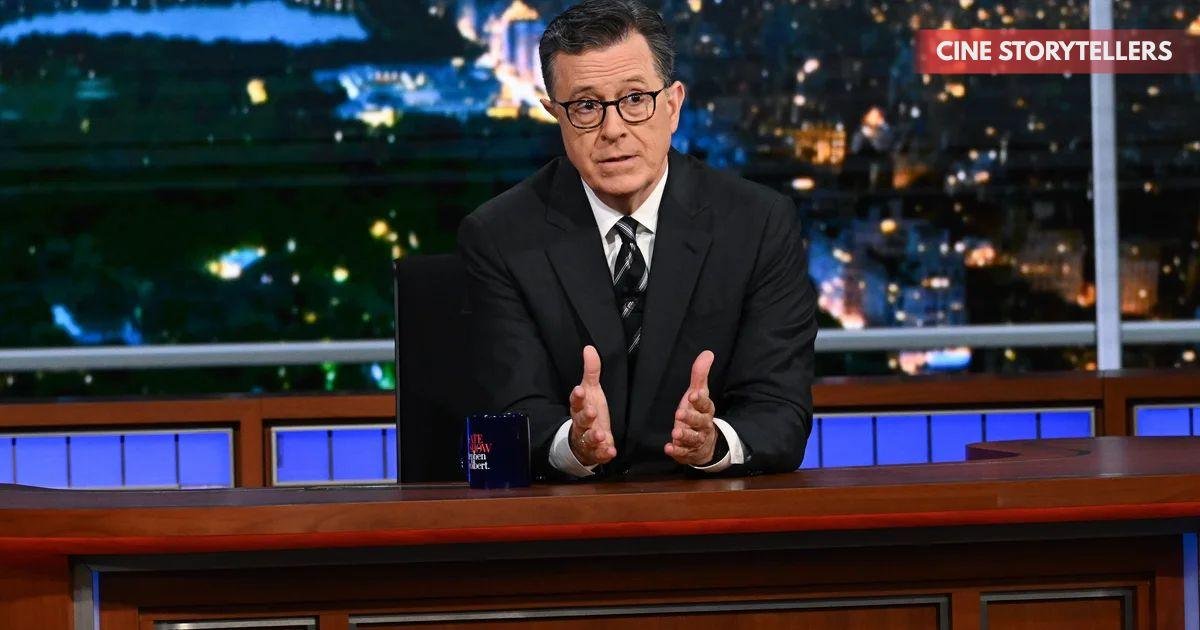When Stephen Colbert took over The Late Show in 2015, he inherited one of late-night TV’s most iconic platforms. But rather than following the traditional path of balancing celebrity interviews and light humor, Colbert leaned heavily into partisan political comedy. Over the years, his focus on politics—particularly through sharp critiques of conservative figures and Donald Trump—has transformed the way audiences consume late-night television. Today, Colbert’s Late Show is more than entertainment; it’s a hub for political commentary and cultural influence.
The Rise of Political Comedy in Late-Night Television
Late-night TV has always touched on politics, but never to the extent we see now. Shows like The Tonight Show historically relied more on celebrity appearances and broad humor. Colbert broke that mold by creating a nightly space where politics dominates the conversation. His shift mirrored the public’s growing appetite for political news in comedic form, especially during turbulent political eras.
This evolution turned Colbert into one of the most trusted voices for politically engaged viewers, particularly those leaning liberal. The intersection of comedy and commentary made late-night less about laughs alone and more about shaping public discourse.
Stephen Colbert and the Trump Era: Comedy Meets Resistance
No late-night host embodied the anti-Trump resistance quite like Stephen Colbert. From 2016 to 2020, his monologues consistently went viral, dissecting policies, scandals, and rhetoric with both wit and conviction.
Colbert’s ratings surged during this period, surpassing competitors like Jimmy Fallon and Jimmy Kimmel. Viewers who felt alienated or frustrated by mainstream political coverage turned to The Late Show for a mix of humor and validation. In this way, Colbert became not just a comedian, but also a political commentator shaping opinions.
Partisan Comedy: Dividing or Connecting Audiences?
One of the strongest critiques of Colbert’s approach is that his comedy has become partisan, appealing mostly to liberal audiences. Unlike Johnny Carson or even Jay Leno, Colbert doesn’t aim for neutrality. Instead, his humor is rooted in political alignment, often mocking conservatives and amplifying progressive ideals.
While this alienates certain demographics, it also cements loyalty among his target audience. Fans tune in not just for laughs, but also for affirmation of their beliefs. The result is a late-night landscape more polarized than ever before—mirroring the political divisions in America.
The Role of Comedy in Political Discourse
Some critics argue that late-night comedy shouldn’t be partisan, but supporters counter that humor has always been political. Satirists like Jon Stewart, George Carlin, and Bill Maher paved the way for Colbert’s style of socially conscious comedy.
Moreover, Colbert uses humor to simplify complex issues, making politics accessible to younger audiences who might otherwise disengage. By blending comedy with current events, he ensures that discussions about democracy, voting rights, and social justice reach millions in a digestible, shareable format.
Comparing Colbert to Other Late-Night Hosts
- Jimmy Fallon: Known for lighthearted sketches and celebrity fun, Fallon avoids politics whenever possible. This neutrality has kept him broadly appealing but less culturally impactful.
- Jimmy Kimmel: While not as overtly partisan as Colbert, Kimmel often incorporates personal stories and emotional monologues on healthcare, gun control, and social justice.
- Trevor Noah (The Daily Show): Similar to Colbert, Noah leaned heavily into political satire but focused more on global perspectives.
Colbert stands out because his show has become almost entirely defined by political comedy, which is both his strength and his biggest risk.
How Partisan Comedy Shapes Public Opinion
Studies show that viewers of political comedy programs often become more politically informed than those who rely on traditional news sources. Colbert’s satirical take encourages audiences to think critically, question authority, and engage in civic issues.
For liberal-leaning audiences, The Late Show acts as both a source of information and emotional relief in polarized times. His humor transforms frustration into laughter, helping audiences process political chaos while still staying informed.
The Criticism: Is Colbert Too Political?
While Colbert’s fans appreciate his commitment to political satire, detractors argue that his comedy alienates conservative viewers and diminishes late-night’s role as a unifying cultural platform. Some critics even suggest that partisan comedy contributes to America’s broader political polarization.
Still, Colbert himself embraces this role. He has stated that ignoring politics in today’s climate would feel disingenuous, given the influence and reach of his platform.
The Future of Partisan Comedy in Late-Night Television
As the 2024 U.S. presidential election and beyond continue to dominate headlines, late-night shows will likely remain politically charged. Colbert has proven that partisan comedy not only attracts loyal audiences but also shapes cultural dialogue in profound ways.
The question is whether this trend will continue—or whether audiences will eventually crave a return to lighter, less divisive comedy. Either way, Stephen Colbert has permanently changed the blueprint for what late-night TV can be.
Conclusion: Stephen Colbert’s Lasting Influence
Stephen Colbert’s Late Show is not just a late-night talk program; it’s a political institution wrapped in comedy. His unapologetically partisan approach has redefined late-night television, creating a space where humor, politics, and cultural commentary intersect nightly.
Whether you love him or find his comedy too partisan, there’s no denying Colbert’s cultural and political influence. By transforming his stage into a forum for satire and political engagement, he has left an indelible mark on both comedy and democracy.
Also Read : 2025 Kids’ Choice Awards: Full Winners List, Highlights, and Memorable Moments
Final Thoughts
In an era when Americans are deeply divided, Stephen Colbert’s partisan comedy serves both as a mirror and a megaphone for public sentiment. His approach may not appeal to everyone, but it undeniably reflects the evolving role of late-night television in shaping political narratives.
Join our WhatsApp channel for more updates and information about celebrities and entertainment

I’m Atul Kumar, founder of Cine Storytellers and an entertainment creator with 5+ years of experience. I cover films, celebrities, music, and OTT content with a focus on accurate, ethical, and engaging storytelling. My goal is to bring readers trustworthy entertainment news that informs, inspires, and goes beyond gossip.
Discover more from Cine Storytellers
Subscribe to get the latest posts sent to your email.
